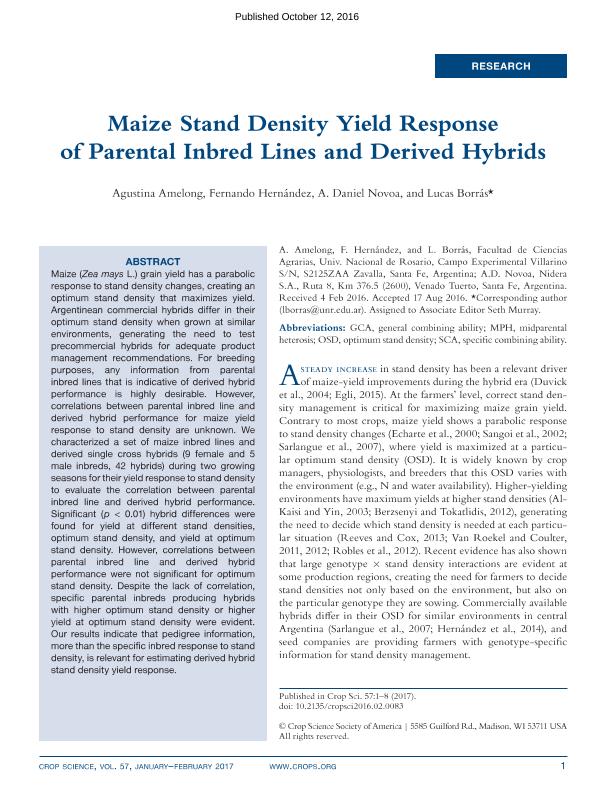Artículo
Maize stand density yield response of parental inbred lines and derived hybrids
Fecha de publicación:
01/2017
Editorial:
Crop Science Society of America
Revista:
Crop Science
ISSN:
0011-183X
e-ISSN:
1435-0653
Idioma:
Inglés
Tipo de recurso:
Artículo publicado
Clasificación temática:
Resumen
Maize (Zea mays L.) grain yield has a parabolic response to stand density changes, creating an optimum stand density that maximizes yield. Argentinean commercial hybrids differ in their optimum stand density when grown at similar environments, generating the need to test precommercial hybrids for adequate product management recommendations. For breeding purposes, any information from parental inbred lines that is indicative of derived hybrid performance is highly desirable. However, correlations between parental inbred line and derived hybrid performance for maize yield response to stand density are unknown. We characterized a set of maize inbred lines and derived single cross hybrids (9 female and 5 male inbreds, 42 hybrids) during two growing seasons for their yield response to stand density to evaluate the correlation between parental inbred line and derived hybrid performance. Significant (p < 0.01) hybrid differences were found for yield at different stand densities, optimum stand density, and yield at optimum stand density. However, correlations between parental inbred line and derived hybrid performance were not significant for optimum stand density. Despite the lack of correlation, specific parental inbreds producing hybrids with higher optimum stand density or higher yield at optimum stand density were evident. Our results indicate that pedigree information, more than the specific inbred response to stand density, is relevant for estimating derived hybrid stand density yield response.
Palabras clave:
MAIZE
,
GRAIN
,
MAIZE MANAGEMENT
,
YIELD
,
STAND DENSITY
,
HETEROSIS
Archivos asociados
Licencia
Identificadores
Colecciones
Articulos(IICAR)
Articulos de INST. DE INVESTIGACIONES EN CIENCIAS AGRARIAS DE ROSARIO
Articulos de INST. DE INVESTIGACIONES EN CIENCIAS AGRARIAS DE ROSARIO
Citación
Amelong, Agustina; Hernández, Fernando; Novoa, Florencia Daniela; Borras, Lucas; Maize stand density yield response of parental inbred lines and derived hybrids; Crop Science Society of America; Crop Science; 57; 1-2017; 32-39
Compartir
Altmétricas




